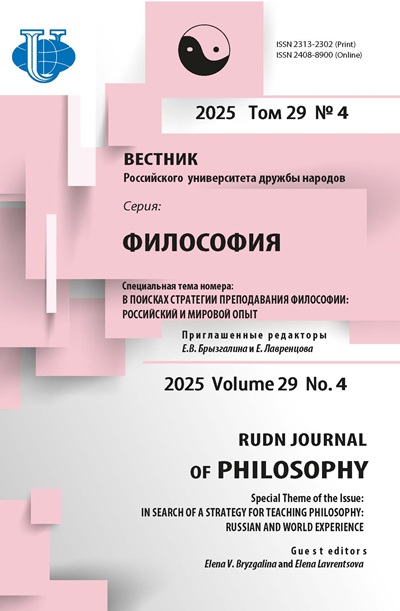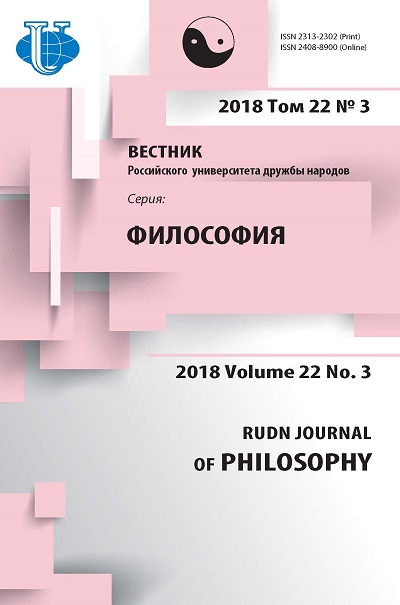О ПРЕДМЕТНОСТИ ДИАЛЕКТИКИ В ТРУДАХ АВРЕЛИЯ АВГУСТИНА
- Авторы: Тащиан А.А.1
-
Учреждения:
- Кубанский государственный университет
- Выпуск: Том 22, № 3 (2018)
- Страницы: 341-352
- Раздел: ИСТОРИЯ ФИЛОСОФИИ
- URL: https://journals.rudn.ru/philosophy/article/view/19331
- DOI: https://doi.org/10.22363/2313-2302-2018-22-3-341-352
- ID: 19331
Цитировать
Полный текст
Аннотация
Концепция диалектики у Августина сочетает три античных традиции: аристотелевскую, стоическую и (нео)платоническую. Ее предметность, однако, следует рассматривать не только эмпирически как смешение исторических элементов, но и собственно философски, в соотнесении с ее собственным понятием. В случае такого логического подхода всякая особенная историческая форма диалектики является ступенью в сознании ее понятия, так что элементы августиновской доктрины выстраиваются в иерархию. Высшая ступень этой иерархии - неоплатоническая, и на ней понятие диалектики у Августина достигает своей собственно разумной, или абсолютной, формы. Но хотя диалектика у Августина получает титул «истинной истины», она не полагается как конкретное единство субстанции-субъекта , каковым в себе является ее понятие. Понадобится более четырнадцати веков развития мышления, пока процессуальность познающего субъекта не будет признана необходимой предпосылкой субстанциального царства метафизики, что собственно и произойдет на исходе модерна в гегелевской диалектике.
Ключевые слова
Об авторах
Андрей Артемович Тащиан
Кубанский государственный университет
Автор, ответственный за переписку.
Email: tashchian@gmail.com
кандидат философских наук, доцент, профессор кафедры философии Кубанского государственного университет
ул. Ставропольская, 149, Краснодар, Россия, 350040Список литературы
- Malatesta M. Dialectic // Augustine through the Ages: An Encyclopedia. Grand Rapids, MI; Cambridge, U.K.: Eerdsmans, 1999. P. 269-271.
- Malatesta M. St. Augustine’s Dialectic from the Modern Logic Standpoint // Metalogicon. 1995. Vol. 8. № 2. P. 91-120.
- Pépin J. Saint Augustin et la Dialectique. Villanova: Villanova University Press, 1976.
- Brachtendorf J. The Decline of Dialectic in Augustine's Early Dialogues // Studia Patristica, Vol. 37. Leuven: Peeters Press, 2001. P. 25-30.
- Heßbrüggen-Walter S. Augustine's Critique of Dialectic // Augustine and the Disciplines: From Cassiciacum to Confessions. Oxford: Oxford University Press, 2005. P. 184-205.
- Topping R. Happiness and Wisdom: Augustine’s Early Theology of Education. Washington, D.C.: The Catholic University of America, 2012.
- Uhle T. Augustin und die Dialektik. Tübingen: Mohr Siebeck, 2012.
- Marrou H.-I. Saint Augustin et la fin de la culture antique. Paris: De Boccard, 1983.
- Patrologiae cursus completus: Series Latina / Ac. J.-P. Migne. Parisiis, T. 32 [=PL 32], 1877.
- PL 43, 1845.
- PL 41, 1900.
- Diogenes Laertius. Lives of Eminent Philosophers in 2 vols. Vol. 2. London: W. Heinemann; NY: G.P. Putnam’s Sons, 1925.
- Aristotle. Posteria Analytics. Topica. London: W. Heinemann; Cambridge, MA: Harvard University Press, 1960.
- Fischer B. De Augustini disciplinarium libro qui est de dialectica. Ienae Typis G. Nevenhanhi, 1912.
- Jackson B. Introduction // Augustine. De Dialectica. Dordrecht, Holland; Boston, USA: D. Reidel Publishing Company, 1975. P. 1-75.
- Bucher T. Zur formalen Logik bei Augustinus // Freiburger Zeitschrift für Philosophie und Theologie. 1982. Bd. 29. № 1-2. S. 3-45.
- Epictetus. The Discourses as Reported by Arrian, the Manual, and Fragments in 2 vols. Vol. 1. Cambridge, MA: Harvard University Press; London: W. Heinemann, 1956.
- PL 34, 1887.
- Svensson M. Theorie und Praxis bei Augustin. Freiburg im Breisgau: Karl Alber, 2007.
- Sextus Empiricus in 4 vols. Vol. 2. London: W. Heinemann; Cambridge, MA: Harvard University Press, 1967.
- Plotinus in 7 vols. Vol. 1. Cambridge, MA: Harvard University Press, 1989.
- Schiaparelli A. Plotinus on dialectic // Archiv für Geschichte der Philosophie. 2009. Vol. 91. № 3. P. 253-287.
- Plotini opera omnia. Porphyrii. Liber de vita Plotini. Cum Marsilii Ficini commentariis et ejusdem interpretatione castigata. Vol. 1. Oxonii, e typographeo academico, 1835.
- Gilson E. Introduction à l'étude de Saint Augustin. Paris: J. Vrin, 1987.
- PL 42, 1841.
Дополнительные файлы















